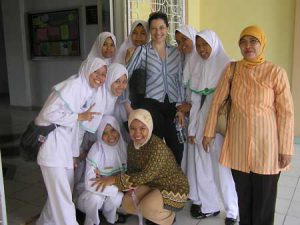
By Jim Hynes
A McGill researcher is one of the leaders of a new global health research project seeking to approach the problem of health inequities using child labour as the entry point.
Dr. Anne Andermann, an Assistant Professor in the Dept. of Family Medicine and an Associate Member in the Dept. of Epidemiology, Biostatistics and Occupational Health is one of the two principal investigators in the Child Labour Evidence to Action Research Group (CLEAR), a project attempting to use primary health care to break the cycle of entrenched, multi-generational health inequities by developing interventions to tackle child labour and promote childhood development. The group, consisting of 27 researchers and knowledge users in Bangladesh, Brazil, Niger and Pakistan, global knowledge users from the World Health Organization (WHO) and the International Labour Organization (ILO), and an interdisciplinary team of researchers from McGill and other Canadian and US universities, will be holding its first meeting June 16-18 in the Dept. of Family Medicine.
The meeting comes on the heels of the World Day Against Child Labour (June 12), an initiative of the ILO to draw attention to the plight of the millions of children engaged in dangerous work that deprives them of basic rights, including health and education.
Andermann, a Montreal native and Rhodes Scholar, combines clinical work, research, teaching and public health practice. Her research interests focus on evidence-based decision-making for health, from patient choice to global policy. As a staff member at the WHO in Geneva, she worked on developing core competencies to strengthen research capacity in developing and transitional countries. Andermann was also a member of the WHO Research Ethics Review Committee and a main contributing author of the World Health Report 2008 on increasing universal access to primary health care.
“Working with vulnerable populations, I came to realize that child labour could be an entry point for addressing the transfer of health and social inequities from one generation to the next,” Andermann said. “If we could do something about that, we would be making an important step forward in improving global health and reducing health inequities.
“There are many different types of interventions to tackle the issue of child labour, such as conditional cash transfer programs, minimum age laws, work permits, and so forth,” Andermann said. “We got to thinking, ‘how can we contribute?’ And here we were sitting in the Dept. of Family Medicine. And so the idea was that, ‘we can’t build schools – we’re not in that business. But we are in the business of providing social support, education, counselling, clinical care and referral’.”
At the top of CLEAR’s agenda is to create a “toolkit” to equip primary care outreach workers in low-resource settings with the skills to prevent child labour and to reduce harm among children in hazardous work.
“The purpose of the research is to develop the toolkit in a participatory way, and then to test the effectiveness in improving health and social outcomes. Whether the toolkit is used by Lady Health Workers in Pakistan (community trained women who provide basic health care), or interdisciplinary primary care teams of physicians, nurses and social workers in Brazil, the goal is to have a common set of interventions that can work across different contexts and settings,” Andermann said. “It’s not just about money, it’s about providing support to families and changing attitudes. Currently, very few interventions focus on these areas.”
As part of World Day Against Child Labour activities, Andermann’s research assistants, Max Deschner and Martijn Hofman, will be hosting an event on June 9 from 4-6 pm in the Dept. of Family Medicine, 517 Pine Ave W. The group plans to show a short film and lead a discussion about what university students can do to make a difference in global health. For more information, contact anne.andermann@mcgill.ca.
